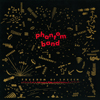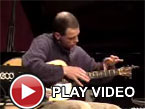Phantom Band, "Freedom of Speech"
 Freedom of Speech bursts with tons more energy than the group's debut. Whereas the first Phantom Band album seemed to meander with more style than substance, here the group have a target to use the sharp edge of their music on. Although not a perfect record, this is head and shoulders above their debut as they finally manage to fully integrate their new world music influences into their tight, groove-based music.
Freedom of Speech bursts with tons more energy than the group's debut. Whereas the first Phantom Band album seemed to meander with more style than substance, here the group have a target to use the sharp edge of their music on. Although not a perfect record, this is head and shoulders above their debut as they finally manage to fully integrate their new world music influences into their tight, groove-based music.
Immediately a thundering, military rattle on the drums heralds in "Freedom of Speech" which features some mind-boiling electronic murmurings in addition to an instantly untrustworthy monologue which promises that "your government will not interfere." Cold War paranoia and Orwellian fears permeate the music, giving it the gravity it needed badly. "Brain Police" throws an idea of Frank Zappa's into a completely different perspective in the context of the time and place in which this album was performed. Just across the border, the Stasi were acting out the nightmare hiding in Zappa’s words.
Unfortunately, Freedom of Speech is not without its faults with my chief concern being Sheldon Ancel’s vocals which sometimes seem passionless compared to the music being put out by the rest of the band. On "Relax" he attempts to (hopefully) lampoon those creepy self-help cassettes that thankfully have seemed to have disappeared. However, all he manages to do is ruin a fantastic piece of music; the drifting guitar and synths cascading over of Liebezeit’s heartbeat-like drumming. On "Trapped Again," Ancel sounds like a bad actor, again detracting from what would be a better instrumental piece. Yet, despite my misgivings with these pieces, Sheldon does a great job otherwise. His delivery on "No Question" brings to mind Ian Curtis’ early demo recordings with Joy Division, full of vigor and vitriol and on top of the post-20 Jazz Funk Greats pop of "Dream Machine," it is hard to imagine another singer doing a better job.
Much like Phantom Band’s first album, Freedom of Speech sounds of its time. However, although I can place it in a timeline based on how it sounds, it rarely comes across as dated. The group tapped into a mood which echoes on today: an oppressive curtaining of Europe which cut friends and family from each other, a wall both physical and political. The music resonates in the same way as the first wave of krautrock captured the revolutionary feeling of the late '60s and early '70s. The actions are long consigned to history but they reverberate on in the art of the day.
samples:
 




